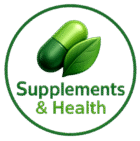Supplements are having a moment.
A 2022 survey of more than 3,100 U.S. adults indicated that 75 percent take some form of nutritional supplement. Of those consumers, 52 percent said they took a specialty supplement, like omega-3s, probiotics, or fiber.
Johna Burdeos, RD, a registered dietitian, says a myriad of factors have contributed to the popularity of supplements, vitamins, and minerals, including the pandemic and ease of purchasing via online retailers.
Still, supplements aren’t without their detractors. The industry isn’t regulated by the U.S. Food & Drug Administration (FDA).
Plus, you may wonder whether you need dietary supplements if you’re eating a well-balanced diet.
Here’s what the research and experts have to say about when it’s beneficial to add vitamins, minerals, and supplements to your diet, plus which ones to choose.
Are supplements necessary?
The subject is up for debate, even among experts.
“Supplements are not usually the only possible solution for most adults to achieve and maintain good health,” says Maddie Pasquariello, MS, RDN. “In fact, for many of those experiencing health problems, supplements are not usually the first line of defense that dieticians will turn to.”
Other lifestyle tweaks, like changes to diet and exercise recommendations, typically come first.
That said, supplements are recommended as a standard in some cases. In other cases, they may help fill in the gaps for nutrient deficiencies in the diet, says Stephanie Greunke, RD, a registered dietician and member of Needed‘s practitioner collective.
Supplements you (might) need, based on research and experts
Supplements may have their detractors, but some can be beneficial, particularly in specific circumstances.
Prenatal vitamin
The American College of Obstetricians and Gynecologists recommends people with uteruses should begin taking prenatal vitamins when they start trying to become pregnant and continue intake throughout pregnancy. Burdeos recommends starting three months in advance of your first attempt to become pregnant.
The CDC recommendsTrusted Source taking prenatal vitamins with 400 mg of folic acid to protect against certain birth defects.
The ACOG recommends getting at least 27 milligrams of iron per day during pregnancy, something often found in prenatal vitamins.
Burdeos says folic acid combined with iron provides benefits for a fetus.
“Folic acid helps prevent neural tube defects, which are serious abnormalities in the baby’s brain and spinal cord,” Burdeos says. “Iron helps facilitate the transportation of oxygen throughout the body. Iron helps support the proper development of the baby and the placenta.”
Vitamin D
About 42 percent of people are vitamin D deficient, and Black people have the highest rates— 82 percent, according to a 2022 studyTrusted Source.
The sun is a natural source of vitamin D, and egg yolks and fatty fish are quality food sources. Other than that, it’s slim pickings, according to the National Insitute of Health (NIH)Trusted Source.
“It’s nearly impossible to get all the vitamin D you need from food alone,” Greunke says. “Oily fish, mushrooms, and fortified dairy provide vitamin D, but not in sufficient quantities to meet daily needs.”




